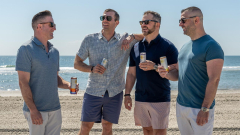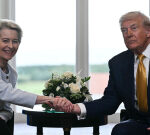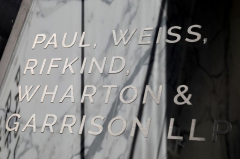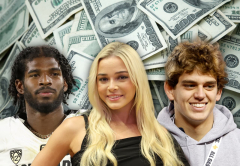The cult canned iced tea and vodka beverage, led by Clement Pappas and Matt Quigley, could bring in $300 million this year—in the golden age of ready-to-drink cocktails.
The backstory of Surfside, this summer’s most popular ready-to-drink spirits beverage, starts with trash, and particularly what vodka entrepreneur Matt Quigley noticed on the streets of Philadelphia—a lot of discarded bottles of iced tea.
“People just don’t naturally digest their surroundings enough,” says Quigley, the 41-year-old president of Pennsylvania-based Stateside Brands. “If you look at what is smashed on the curb and the street, it’ll tell you a lot about what the people of your city are actually drinking. And, in Philadelphia, that means it’s a ridiculous amount of iced tea. You’ll find Twisted Tea, yes, but you’ll also find Snapples, and a lot of other brands.”
Quigley brought the idea to his business partner Clement Pappas, Stateside’s 51-year-old CEO, and they set out to produce alcoholic iced teas and lemonades to compete with hard seltzers and other canned drinks, as better-for-you versions of the classic Twisted Tea or Mike’s Hard Lemonade. And now with Surfside in its third summer on the market, customers are crushing Surfside after Surfside, especially along the beaches of the Northeast coast. So far this summer, Surfside cans were the fastest-growing of any beer or ready-to-drink (RTD) cocktail, with an increase of $70 million in retail sales year-to-date. This month, Surfside hit the milestone of topping 5 million cases sold in 2025, besting what sold for all of last year.
“I’ve been on a flat-out sprint for three-plus years now, trying to keep pace with it,” Pappas tells Forbes.
Surfside is expected to sell as many as 12 million cases this year, which would mean hitting revenue of as much as $300 million. The RTD cocktail brand ended 2024 with $100 million in estimated revenue, and as the fastest-growing brand across all alcoholic beverages, according to NielsenIQ, hitting more than 360% sales growth compared to a year prior.
Those financials have made Surfside and its parent company Stateside Brands a hot acquisition target. Pappas and Quigley, along with their brothers Zach Pappas (a board member) and Bryan Quigley (Surfside’s chief sales officer), are the company’s four cofounders, and they have already turned down several acquisition offers this year and last. Pappas and Quigley tell Forbes they have no intention of selling.
“We’re masters of our own destiny at this point,” says Pappas.
He says they have bootstrapped the business this long and continue to be well-capitalized. The four cofounders together own 90% of the business, with the Pappas brothers as the primary investors, though no cofounder owns an outright majority. A few friends and family who invested early on make up the remainder.
Thanks to Surfside’s runaway success, Stateside is quite profitable, with estimated EBITDA margins of 30%. Stateside declined to comment on the business’ profitability and valuation. But Pappas confirmed he has reinvested much of its profits back into the business, which Forbes estimates is worth at least $500 million.
“We have the opportunity with Surfside to build ourselves into a company of substantial scale and distribution and all the things that go with that—all the marketing partnerships and the scale and the capital to launch other brands,” says Pappas. “But Surfside is our ticket to the dance. If we don’t succeed on that, we don’t have that scale and that distribution and these connections with the Costcos and Walmarts and Targets.”
Pappas grew up south of Philadelphia in Vineland, New Jersey, one of three sons in a family with a wholesale fruit juice business called Clement Pappas & Co., named for its founder, Pappas’ grandfather, an immigrant from Greece, who started the business in 1942. And the third-generation Pappas ended up taking it over as CEO in 1999. Then amid pressure from some family shareholders, Pappas architected the sale of the business for $400 million to Lassonde Industries in 2011. (It’s now known as Lassonde Pappas.)
After he and his family cashed out, Pappas stayed on for a few years as CEO but it “wasn’t working out,” he recalls. “I had never wanted to sell.”
And then in 2014 he was hosting his 40th birthday party at his townhome in Philadelphia and Quigley devised a plan to have his business plan crash it. A friend of Quigley’s was invited and Quigley, who grew up in Philadelphia as a hobby distiller in his parents’ basement before spending two years learning how to distill spirits at several apprenticeships, sent along with him a copy of his business plan for a Pennsylvania-made vodka company.
The mutual friend snuck the presentation in Pappas’ office, and Pappas called Quigley the next day and said if Quigley wanted to discuss it, he had better come over right away. With a fresh shower and shave, Quigley made it to Pappas’ house within 30 minutes. Two and a half hours and a few drinks later, they had hit it off.
“It was a fun first date, if you will,” recalls Quigley.
After another six months of development, the Quigley brothers signed with the Pappas brothers. As development continued, in July 2015 tragedy struck: Pappas and his wife lost their premature son, Peter. (The parents of two other sons, Paul and Joseph, created a foundation with the mission of curing preeclampsia by 2050.)
But Pappas kept moving forward. By October 2015, Stateside vodka started selling. The first full year saw under 600 cases of vodka sold. But they kept at it, and sales grew. And then by 2018, Stateside became the biggest spirit made in Pennsylvania with nearly 5,000 cases





